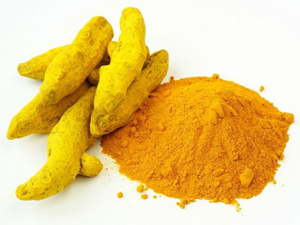PROVEN HEALTH BENEFITS OF TURMERIC (Haldi)
 Turmeric comes from the root of the curcuma longa plant belonging to ginger family Zingiberaceae, which has a hard yellowish brown peel and orange flesh. It is widely grown in southern and south-western tropical Asia and throughout Indian subcontinent. It is a wonderful spice having several proven health benefits. Packed with goodness, it can improve skin, heart and brain health, and digestion; elevate mood; and give a boost to overall health. Most commonly added as powder to curries and dishes, it gives lovely yellow-color and flavor to the food. Turmeric powder can also be added to warm milk and salads. Although also available as supplements, raw turmeric is regarded as the most effective form. Turmeric has been used for treatment in Chinese and Indian systems of medicine for centuries. The following properties make turmeric so beneficial for human health:
Turmeric comes from the root of the curcuma longa plant belonging to ginger family Zingiberaceae, which has a hard yellowish brown peel and orange flesh. It is widely grown in southern and south-western tropical Asia and throughout Indian subcontinent. It is a wonderful spice having several proven health benefits. Packed with goodness, it can improve skin, heart and brain health, and digestion; elevate mood; and give a boost to overall health. Most commonly added as powder to curries and dishes, it gives lovely yellow-color and flavor to the food. Turmeric powder can also be added to warm milk and salads. Although also available as supplements, raw turmeric is regarded as the most effective form. Turmeric has been used for treatment in Chinese and Indian systems of medicine for centuries. The following properties make turmeric so beneficial for human health:
Anti-inflammatory properties: Turmeric is known for its great anti-inflammatory properties. Research has shown that curcumin, a compound found in turmeric, prevents the release of protein responsible for swelling and pain and thus inhibits swelling. Its anti-inflammatory benefits remarkably reduce the progress of osteoarthritis and relieve associated pain, thus increasing mobility naturally and safely, among osteoarthritis patients. Curcumin also prevents joint inflammation and is beneficial for those with autoimmune diseases including rheumatoid arthritis. The anti-inflammatory characteristics of curcumin are as effective as certain drugs used against inflammation.
Aids digestion: Turmeric aids digestion by naturally boosting the digestive system. Turmeric contains certain components that stimulate gallbladder to produce bile that helps with digestion of food. Consuming raw turmeric helps manage many digestive problems such as bloating and gas and may also help treat stomach ulcers and irritation.
Anti-cancer properties: Curcumin present in turmeric can be useful in the natural treatment of many cancers such as lung, breast, stomach, skin and colon cancers.
Antioxidant properties: The antioxidant properties of turmeric make it an excellent agent against free radicals. It destroys the free radicals responsible for the destruction of cells in the body. Turmeric also obstructs peroxidation and reduces iron complex in the body. These properties help in balancing insulin levels in the body and may also help slow down the onset of Type 2 diabetes.
 Aids weight loss: Curcumin in turmeric fights obesity and can help overweight people in weight management by reducing growth of fat cells. High level of stress can lead to weight gain due to release of stress hormone cortisol which induces the stomach cells to accumulate fat near stomach. Turmeric helps balance cortisol and thus prevents the increasing size of your waist.
Aids weight loss: Curcumin in turmeric fights obesity and can help overweight people in weight management by reducing growth of fat cells. High level of stress can lead to weight gain due to release of stress hormone cortisol which induces the stomach cells to accumulate fat near stomach. Turmeric helps balance cortisol and thus prevents the increasing size of your waist.
Boosts brain health and prevents neurological issues: Turmeric boosts the regeneration of neurons (brain cells). Its anti-oxidant and anti-inflammatory properties provide overall protection to the brain. A bioactive compound called turmerone present in turmeric can increase growth of neural stem cells by up to 80%. Turmeric helps in Alzheimer’s too by preventing destructive agents like beta-amyloids from accumulating in the patient’s brain. It is also helpful in the treatment of other problems such as depression, diabetic neuropathy, and tardive dyskinesia.
Improves stress tolerance: Turmeric due to the presence of curcumin considerably improves your resilience and ability to tolerate stress. Curcumin is a known adaptogen, i.e., it has the ability to help you adapt better to stress stimuli by modulating the release of stress hormones by adrenal glands. As adaptogen, it not only enhances resilience against stress in critical situations but also helps in maintaining healthy levels of stress hormone in the body in general.
To read this article in Hindi, click here
Disclaimer: The content on this website is not intended to be a substitute for profes-sional medical advice or treatment. Although most foods are generally safe, some of them may have side effects. Ask4healthcare advises these to be taken/practised at user’s own discretion.
- Are you troubled by ACIDITY / HEARTBURN? - September 13, 2019
- Ways to tackle INSOMNIA - September 12, 2019
- Eliminating the need for anti rejection drugs in transplant patients - September 6, 2019
